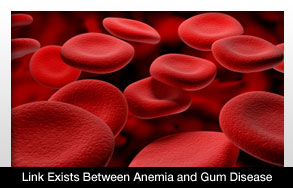 |
People with serious gum disease may develop anemia.
That’s because of the reduction in red blood cells and hemoglobin lead to anemia, according to a new study in the Journal of Periodontology.
The results showed that more than one third of people who experience major periodontitis had hemoglobin levels lower than normal concentrations. After receiving a six-month course of treatment, the patients saw significantly higher levels of red blood cells and hemoglobin. The other measures used to determine the health of the blood improved as well.
According to the study, women also were at a higher risk of developing anemia than men were. Fewer than 30 percent of the men tested had anemia, while more than 40 percent of the women had anemia.
The chemicals the body produces from the inflamed gums may be the factor that adversely affects the blood and hemoglobin and leads to anemia.
The treatment for gum disease, however, diminishes the seriousness of anemia.
By maintaining good oral health, a person usually won’t have to worry about gum disease. That’s also a good first step in limiting the possibility of developing anemia.

|


